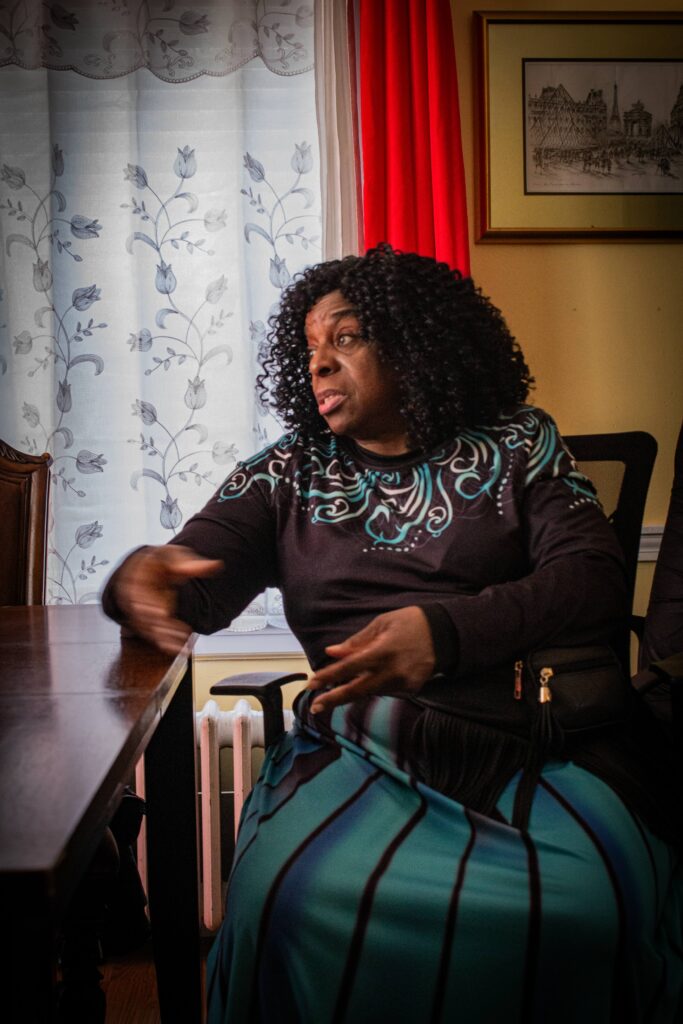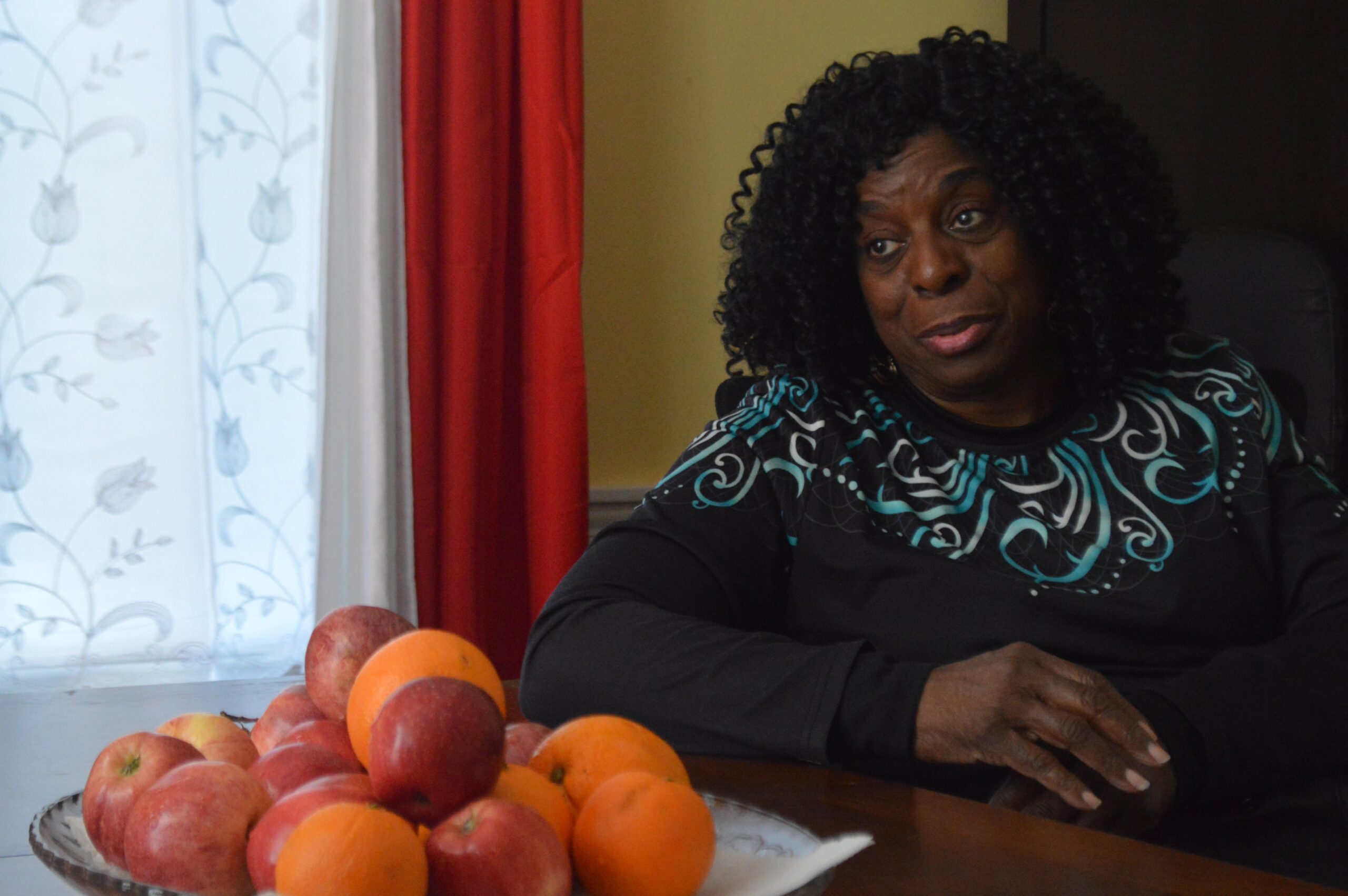By Julianna D’Addona
UConn Journalism
Cynthia R. Jennings, a lifelong resident of Hartford’s North End, remembers wading through standing water to do her laundry. She later developed an illness her doctor attributed to mold. And she has channeled those experiences into helping her community deal with environmental problems.
Her experiences bring to life the impact of Hartford’s flooding problems on residents who have for generations endured floods from untreated waste mixed with water from storms that, in recent decades, have intensified due to climate change.
On a sunny February afternoon, Jennings opened the front door to her house at 86 Hartland Street, in the Blue Hills neighborhood, with a smile. She wore a floor-length blue and black dress. She thanked a group of journalism students for stepping in as the next generation to address climate change. Her passion for advocacy radiated through her kitchen and neat dining room.
“This is very tantamount to the survival of many people in this city, this state, and this country,” Jennings said.
Starting many decades ago, the basement floor of her family’s previous house on Cambridge Street was always covered with a foot and a half of water.
“We had our washing machine up on a pallet so that it would not get wet,” she said. “And we would walk through the water to put our clothes in the washing machine.
About 30 years ago, Jennings became ill. Her doctor suggested the illness was due to the mold that grew from bacteria in the sewage water.
The National Center for Biotechnology Information (NCBI), a division of the National Library of Medicine (NLM), has linked respiratory illness and some cancers to black mold.

Jennings’ old house on Cambridge St. was prone to constant flooding. Its foundation was often wet along with the basement. The fire department would not pump out wastewater, she said, and her family did not have the money to hire a contractor. She said they lived with the water.
But the house where she lives now on Hartland Street and where she raised her son and daughter stands on slightly higher land and did not flood during the childhoods of her children. Her son, Sean Brown, is now 58 years old and lives in North Carolina. Her daughter, Shirene Brown, is 55 and lives in Florida. But in recent years, mixed waste and stormwater flooded this basement. After one storm, Jennings was devastated to find that valuables belonging to her mother had been destroyed. These included irreplaceable pictures, clothes, and shoes.
As of today, a sub pump and backflow preventer were put in about eight months ago. This is a temporary fix until the storm water and sewage water are separated.
In the past two decades, Jennings has watched storms in her neighborhood become more intense, a documented effect of a changing climate.
“Flooding is out of control and placing people out of their homes,” she said.
She channeled her experiences with flooding into her career as a civil rights attorney and an environmental activist. The activism dates to the 1990s, when she and other residents of the North End worried about the health effects of dumping trash in the city landfill in the North Meadows area, about a half mile from her neighborhood.
Jennings moved into politics. She served six years on the Hartford City Council, until 2018, when she had to resign after changing her party affiliation. She ran unsuccessfully as an independent for Secretary of the State in 2022. She ran for office out of a sense of loyalty to her community. She said she would say, “You are not going to ignore us and take our tax money. We pay the same taxes as everybody else.”
According to the Connecticut Data Collaborative and Liberal Arts Action Lab, north Hartford is a predominately African American community in Hartford. As a marginalized population, Jennings said the North End is encumbered with poverty, racial discrimination, low employment rates, and low levels of home ownership.
The state reported in October 2024 that 100% of children in the Hartford public schools qualify for free and reduced lunches.
Jennings connects this statistic to the “Toxic Wastes and Race in the United States” study conducted by The United Church of Christ Commission for Racial Justice, which concludes that minority groups inhabit the most environmentally risky places in America.
Jennings’ former colleague and fellow founding member of the Connecticut Coalition for Environmental Justice, Dr. Mark Mitchell, described Jennings as a powerful force.
“She is tenacious. Obviously, very intelligent. She is passionate, and she’s not afraid to confront those in power,” Mitchell said in an online interview in March 2025.
When Mitchell was health director for the Connecticut Department of Public Health,
Jennings was a block captain in the North End. Mitchell recalls how Jennings, alongside Larry Charles and a former neighborhood group called ONE/CHANE Hartford, led opposition to the landfill’s expansion.
“Whenever the Department of Environmental Protection tried to crack down on the landfill, they would pass laws exempting the North Hartford landfill from the regulations and rules. But it was because of Cynthia Jennings and ONE/CHANE that EPA became involved and that they were able to hold the landfill operators to account because of their opposition and their community organizing,” Mitchell said.
One community particularly important to Jennings is renters. According to Housing Data Profiles, created in collaboration between the Partnership for Strong Communities and the Connecticut Data Collaborative, 63.9% of units in Hartford are renter- occupied.
Jennings advocates that renters get renters’ insurance and that building owners make sump pumps available to renters, because the owners must give permission for residents to apply for the state’s grant program that covered repairs and backflow preventers for homeowners. That program allocated about $9 million over two years and is now on hold.
Renters’ and tenants’ insurance policies “will mean that they can live in a hotel with their families while repairs are done to their units,” Jennings said. “Other than that, they face the real possibility of living in a shelter.”
TOP PHOTO: Cynthia Jennings talks with journalists in her home during an interview in Spring 2025. Photo by Christine Woodside
